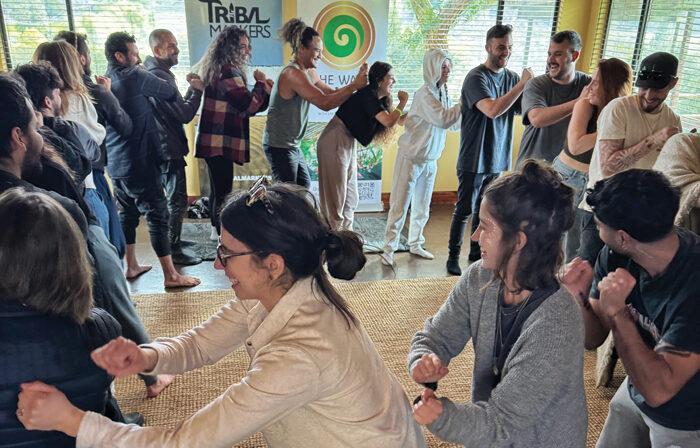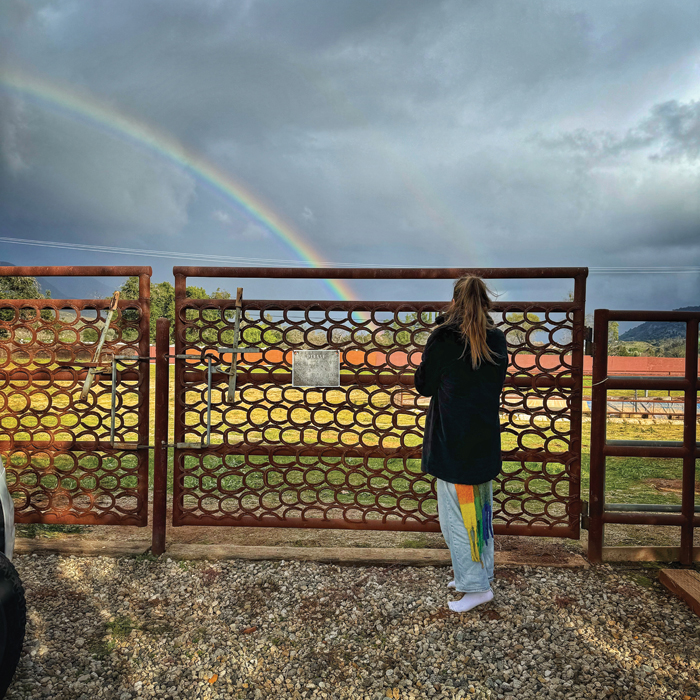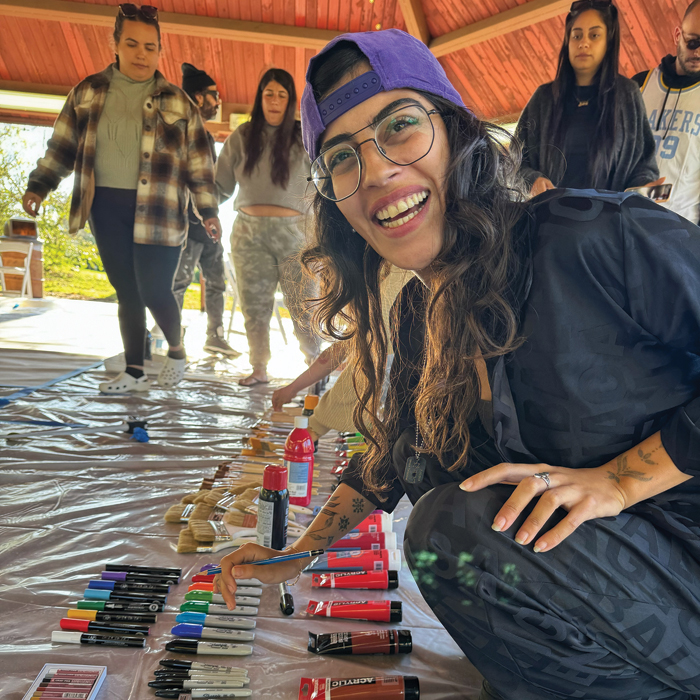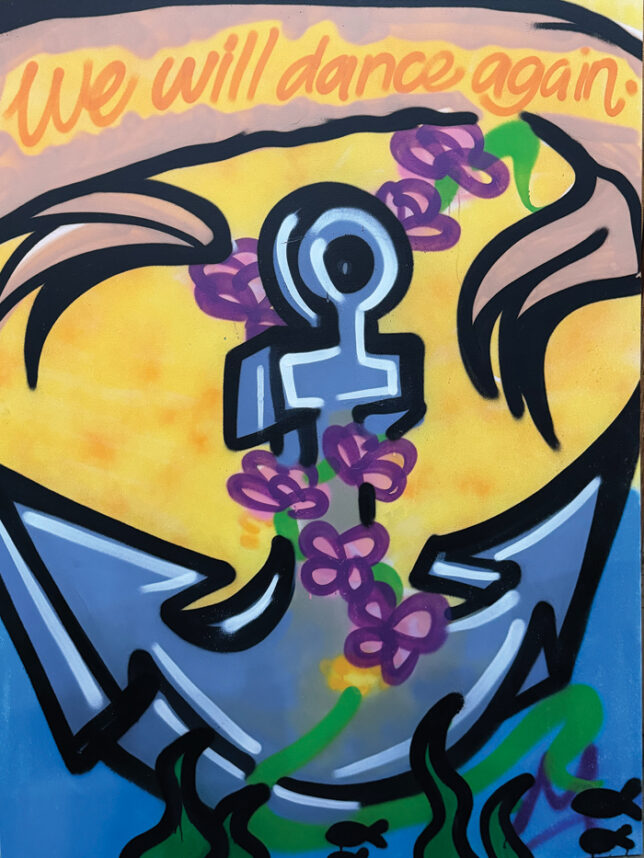
Danielle Sasi loved life. How could she not?
She got married to her husband Maor in 2022. They soon brought a precious baby boy into this world. She was close to her family, especially her father, whom she called her best friend. She felt truly blessed.
And then, Oct. 7 happened. She and her husband had flown from Los Angeles to Israel to attend the Nova Music Festival. They were having a good time, dancing and listening to music all night long – and then Hamas terrorists attacked.
They viciously murdered and wounded innocent civilians, raped women and captured others, taking them back to Gaza as hostages.
Danielle and Maor witnessed death and destruction. To survive, they hid under dead bodies for seven hours.
“My eyes were murdered. My life was vandalized. I was dead on the inside and numb to my core.”
– Danielle Sasi
“My eyes were murdered,” Danielle said. “My life was vandalized. I was dead on the inside and numb to my core.”
After surviving, Danielle found out that Hamas terrorists had murdered her father, her cousin and her husband and another good friend.
“Life before Oct. 7 was innocent,” she said. “I may even call myself naive to what the world went through.”
A month after that tragic day, Danielle and Maor flew back to Los Angeles, to a city where everything seemed normal.
“I was alone and scared,” she said. “My husband and I had no one we could relate to. The community showed their love and of course, had all their questions as to what happened, but there will never be a way to explain really what happened. They were not there.”
Sebastian, who was also at Nova, went to the festival with his girlfriend. On Oct. 7, they ran away as terrorists shot at them; Sebastian dragged his girlfriend to safety and took care of the wounded.
I’m trying to balance myself and relearn who I am.” – Sebastian
“I saw people fall around me,” he said. “Since then, I’ve been experiencing great uncertainty, and it is difficult to find a comfortable routine, or to find the routine in a lack of routine. I’m trying to balance myself and relearn who I am.”
Danielle and Sebastian were disturbed by the horrors they saw at Nova — where Hamas murdered more than 360 people — and have been trying to cope with their trauma from that day. The Jewish community has been stepping up to support them in their time of need, most recently hosting them at Camp Ramah in Ojai for a weeklong, healing retreat. From February 6 to 13, they gathered with 118 other Nova survivors at the Orot Healing Retreat, which was organized by volunteers and paid for by caring sponsors.
Karin Hepner, board president of Irvine Hebrew Day School, took the lead with her sister-in-law Rikki and other local volunteers including Limor Ness, the owner of Kfar Saba Urban Farms, Adi Davis, Miriam Wolf, Sepi Makabi and Rabbi Yonah Bookstein, the founder of Pico Shul and musician Nachum Peterseil put the event together. Craig Dershowitz from Artists 4 Israel was the fiscal sponsor.
“We were all thinking about ways to help our fellow brothers and sisters in Israel since Oct. 7,” Hepner said. “After doing our investigating, we decided that the population that really needed our support right now is the Nova survivors. They don’t have a community. They’re all spread out. Many of them lost contact with close friends and family members. And at this point in life when they’re ready to launch, they’re stuck.”
Bringing in the Survivors
Hepner, a mother of five in Irvine who frequently volunteers in the Jewish community, spoke to a number of organizations in Israel doing relief work before going forward with the retreat. She then worked together with Rikki and the other volunteers to help organize it and find a venue. Camp Ramah gladly stepped up to the plate.
 “They were the host site, but also very much partners in this,” she said. “They were fully invested emotionally and financially in helping us make this happen.”
“They were the host site, but also very much partners in this,” she said. “They were fully invested emotionally and financially in helping us make this happen.”
Hepner and the volunteers then decided on a name: The Orot Healing Retreat.
“We created a space of light for anyone to step into it,” she said.
In a blog post, Bookstein echoed a similar sentiment. “At Orot, our goal was to provide survivors with the opportunity to breathe,” he said. “We wanted to create a safe place to process and share their experiences and an opportunity for survivors to find their strength surrounded by light and love.”
To find volunteers to help throughout the week, Hepner and the others posted online. Hepner started receiving 300 messages a day from people who wanted to volunteer in any way they could, from running yoga classes to cleaning up.
“An instructor in Iowa said he wanted to come out,” Hepner said. “He told me he was happy to come and make food and wash dishes.”
Volunteer spots filled up quickly, and a group from San Diego showed up with 120 backpacks filled with goodies and handmade children’s cards.
“They drove them up to Ojai,” Hepner said. “So many people wanted to help. That’s the Jewish community.”
The campgrounds could accommodate up to 120 people; Hepner ended up receiving 500 applications.
One of those applications came from Danielle Sasi, who had already visited Limor Ness’ farm and participated in a healing evening.
“There, we met a few other Nova survivors and many people who just wanted to help us in any way they can,” she said. “Then, one day, Limor tells us that a group of Nova survivors are coming to a retreat in Ojai. She did everything in her power to help us get in.”
When Sasi arrived — along with her cousin, Lee Sasi, also a Nova survivor — she immediately felt more at peace.
“I entered Camp Ramah, and my healing began,” she said. “I finally felt like I wasn’t alone.”
Healing at the Retreat
Hepner and the volunteers welcomed the survivors with open arms on Feb. 6.
“Before they came, we were talking about 120 Nova survivors,” she said. “But when they arrived, we got to know each and every one of them as individuals. Each one of them has their own harrowing, Holocaust-level story you can’t imagine anyone going through.”
The retreat featured many different activities throughout the weeklong event.
The lead therapist, Guy Zvili, founder of Ruach Adama, who teaches and trains therapists on helping patients heal from crisis, oversaw the sessions with trauma therapists from Israel. There were therapy animals on campgrounds, along with meditation and yoga classes, surfing, singing, art workshops and, of course, dance parties.
Lee said it “was really nice to be around others who have been through what I have been through. The retreat made me feel like I am not alone in this.”
On Oct. 7, when running away from the terrorists, she hid in a bomb shelter on a side of the road with more than 50 other partygoers. They ended up being attacked by Hamas and were terrorized for seven hours with automatic weapons and explosions. Out of the more than 50 people there, only nine survived – Lee was one of them. She lost her uncle during it.
 “Before Oct. 7, life was very simple and normal,” Lee said. “I had a full-time job, and I was full of motivation and very busy with my days. Life after Oct. 7 has been hard, and I’ve had depression. It’s hard to find a spark of any type of motivation. I barely have any discipline within my life, and I feel like my life shattered and now I need to pick up the pieces bit by bit.”
“Before Oct. 7, life was very simple and normal,” Lee said. “I had a full-time job, and I was full of motivation and very busy with my days. Life after Oct. 7 has been hard, and I’ve had depression. It’s hard to find a spark of any type of motivation. I barely have any discipline within my life, and I feel like my life shattered and now I need to pick up the pieces bit by bit.”
After taking part in the Orot retreat, she said, “I’m grateful to be alive … it was very helpful for my healing journey and I’m very thankful I had the opportunity to go.”
Sebastian experienced the same feeling.
“The retreat helped [me] experience life differently, to be free from all the difficulties happening in the country, to experience myself feeling again like a child, insecure for a moment about the universe and life and vulnerable, but safe,” he said. “The retreat brought me back to feeling a little like myself again and remembering who I am and want to be.”
There were group and one-on-one discussions among the survivors and volunteers, and the survivors opened up about what they had gone through.
“I’m deeply sad thinking about some of the conversations I had,” Hepner said. “Not everyone wanted to tell their story, but some did. I saw their pain. One individual was crying and shaking. This was someone who had never stopped smiling the entire time, but it was all right here, beneath the surface. It got me to understand a bit more of what they’ve been through as individuals. We can never really understand, but we can see people who are so ready to live life again.”
After Oct. 7, one survivor, Uriel (not a real name) said that he went from being a much more optimistic and happy person to someone who is “full of sadness, full of fears, including serious concerns about my future and [the future] of those around me. I had lost my motivation and felt that my trust in people and in myself has been irreversibly damaged.”
But following his time at Orot, Uriel felt much more hopeful. “It restored my love, joy and faith in humanity,” he said. “I discovered that although it is possible to experience and absorb so much evil, terrible acts that humanity cannot grasp, there is still goodness and love in the world, and love conquers all. The retreat helped me heal and gave me tools to carry me through my life to deal with crises, pain and challenges.”
Danielle participated in group therapy, where she was able to open up and share her experiences. She also talked about her trauma with her individual therapist, Shelly.
“She was very special,” she said. “I connected with her.”
Danielle got the chance to sing and paint and go on hikes with her fellow survivors, too.
“I was happy and smiling,” she said.
Orot included Shabbat services, which Bookstein led. He described how, right before Friday night dinner, everyone sang “Shalom Aleichem,” the song to welcome in the angels, over and over again.
“We were in a room of people whose angels had all protected them from death just four months ago.” – Rabbi Yonah Bookstein
“We were in a room of people whose angels had all protected them from death just four months ago,” he said.
As the rabbi stood on a chair in the middle of the room, he got ready to sing the Friday night kiddush. But instead of singing the regular tune, he chose one traditionally used for a wedding.
“There was so much joy in the room,” he said. “My brain just made the switch. The joy of chatan and kallah, the bride and groom, the joy that we all have standing at a chuppah. The joy of the promise of the Jewish future. The joy of two people in love and families and friends together. That is the joy in the room. We are the bride, and God is the groom.”
When he finished the blessing, everyone in the room answered with a loud “Amen.”
“I was still,” he said. “It took my breath away.”
We Will Dance Again
The feeling of hope was one that permeated throughout the week at Orot, which culminated in a dance party on Saturday night.
“Not only was it incredibly fun and amazing for the survivors to dance with their friends, but they felt safe and didn’t have to look over their shoulders,” Hepner said. “Remembering what it feels like to be safe was one of the most remarkable outcomes of the event.”
She remembered one survivor, a police officer who could only think about the people she was unable to save on Oct. 7.
She remembered one survivor, a police officer who could only think about the people she was unable to save on Oct. 7. Since that day, she hadn’t been able to look at the sunrise.
“There was a shift in her,” Hepner said. “She started thinking about the ones she did save, and she told me, ‘This is the first time I’ve allowed myself to look at the sunrise since Oct. 7.”
Though the Nova survivors went through tragedy and trauma, they are ready to move forward, to get back some semblance of peace and try to rebuild.
 “There was this whole idea of, ‘We will dance again,’” Hepner said. “It’s a real thing.”
“There was this whole idea of, ‘We will dance again,’” Hepner said. “It’s a real thing.”
Certainly for Danielle, things have shifted following the retreat. Now, she hopes for a brighter future ahead.
“My mom was so happy to see that a bit of light was starting to come into my life again, and so was I,” she said. “Healing is a very [long] journey, and I was not sure how it would even start. But thanks to the retreat, I can say that I’m going through it. I’m learning to live life with the trauma and grief. I would like to extend my gratitude to everyone who made it possible.”
Kylie Ora Lobell is the Community Editor of the Jewish Journal.























 More news and opinions than at a Shabbat dinner, right in your inbox.
More news and opinions than at a Shabbat dinner, right in your inbox.